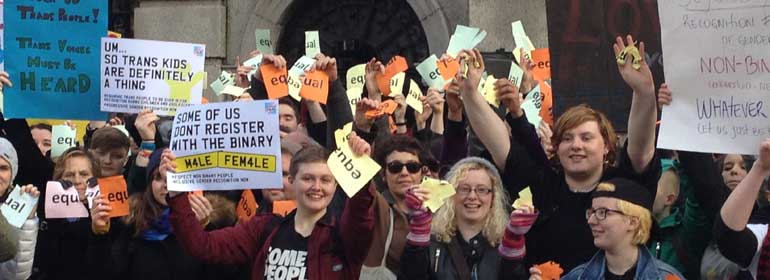Beneath the accepting façade, do we have issues about the inclusion of trans people under the rainbow flag, asks Brian Finnegan?
In the film Love is Strange, currently at the IFI, a well-meaning relative of a gay couple makes a speech at their wedding. It’s the kind of speech you might hear at many same-sex ceremonies, that goes something along the lines of ‘You are an inspirational couple, and we love you just as you are’.
It turns out in the movie, as it often does in real life, the speech is just the surface of a much more complex story. Circumstances scratch away at the socially acceptable, politically correct veneer, and deeply held homophobia, expressed in the most casual of ways, is revealed.
In modern society we all pay lip service to political correctness. On Valentine’s Day, this was clearly illustrated in our own community, when approximately 200 people turned up at a rally outside Leinster House, protesting elements of the Gender Recognition Bill. I put my hand up and say that I was not one of those people – I was unable to be in the city that weekend – but what struck me when I heard the number was that such a low turnout doesn’t reflect the messages we spout about solidarity beneath the LGBT rainbow.
At the moment, the Gender Recognition Bill is going through the various stages towards its enactment. It’s taken almost eight years for it to get this far, given that it comes on the back of a judgment in 2007 by the High Court that Irish legislation was incompatible with the European Convention on Human Rights and that Dr Lydia Foy had the right to change her birth certificate to reflect her gender identity. The fight to win this case took Dr Foy 20 years.
You’d think, given that it took so long to get here, that the government might get it right, and that they’d have listened to the grave concerns of actual trans people when drafting the heads of bill, but that’s not the case. While the bill allows trans people to change their birth certificates, it does so with measures that are bordering on human rights abuses.
For instance, because it’s coming before the Same-sex Marriage Referendum, in order to change their birth cert a married trans man or woman will be forced to divorce. Otherwise there might be inconvenient de facto same-sex marriages on the books. It’s likely that if the referendum is passed that the bill will be subsequently amended to get rid of ‘forced divorce’, but there are more difficult and far-reaching parts of the bill that won’t be changed so easily.
Those chiefly affected are young trans people under 18. As Director of TENI, Broden Giambrone wrote in last month’s GCN, “While this Bill will allow 16 and 17 year-olds to have their gender recognised, they will have to jump through many hoops to be legally recognised. The criteria are so rigorous we fear that it will take these young people up to two years to fulfil them, and that they will be 18 before they can be legally recognised anyway. This Bill also fails to provide any protection for individuals under 16.”
This will essentially shore up an educational system in which young trans people are marginalised and denied. Anti-bullying procedures, produced by the Department of Education and Skills, which include measures against transphobic bullying, must be adopted by schools, yet because of a legislative lack of recognition for trans students, they remain vulnerable to being discriminated against by the authorities anyway. Most young trans people will have already passed through traumatic and psychologically dangerous school years before they have a chance to get the recognition they so desperately need and deserve.
Under the bill as it currently stands, trans people will have to submit to medical evaluation to have their gender identity agreed upon, yet that evaluation is not defined. Some readers may think of a transgender identity as a medically defined state, but it should be remembered that homosexuality was once an identity that was psychiatrically treated. No gay man or lesbian feels they need a psychiatrist to confirm who they are before accessing their rights as individuals, so why should it be any different for trans people?
This year in Ireland, lesbians, gay men and bisexuals are facing a time of great adversity, as people who define themselves as authorities will try to undermine our sense of ourselves as Irish citizens. Already this year I have seen a huge shift towards solidarity in the community as people raise funds across the country, and set up Yes Equality groups, in order to get the Same-sex Marriage Referendum passed. But where is the solidarity with the trans community who are grappling with a bill that undermines while attempting to recognise their rights?
Do we not call ourselves the LGBT community nowadays? Or is it simply lip service? Thousands upon thousands of people will mobilise in the fight for same-sex marriage, so why were there only 200 people at a rally for the equality and recognition of trans people? Could it be that beneath the socially acceptable, accepting veneer, we have issues we need to address about the inclusion of trans people under the rainbow flag? Could it be that we LGBs are only thinking about ourselves in the race for equality, and forgetting that our society isn’t actually equal until everyone is treated equally?
We want straight people to stand up with us for same-sex marriage; we expect our heterosexual brothers and sisters, friends and relations to show their solidarity. So where is our own solidarity when it comes to issues that deeply affect those we claim to support, those we claim to be part of our community?
Lip service is of no benefit to anyone. Let’s put our money and energies where our mouths are.
© 2015 GCN (Gay Community News). All rights reserved.

comments. Please sign in to comment.